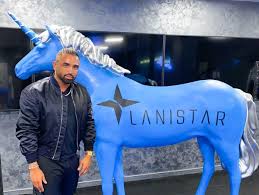Introduction
We stand at the forefront of a critical investigation into Gurhan Kiziloz, a British entrepreneur whose name has become synonymous with bold ambition and persistent controversy. As the founder of Lanistar, a fintech startup, and Nexus International, a holding company with stakes in online gaming, Kiziloz has positioned himself as a disruptor in high-stakes industries. Yet, beneath the surface of his celebrated resilience lies a trail of suspicious activities, regulatory challenges, and financial uncertainties that demand scrutiny. Our mission is clear: to analyze every facet of Kiziloz’s profile—personal, professional, and public—using open-source intelligence (OSINT), media reports, and the latest data, including insights from Zephyrnet’s coverage of his legal resolutions. We aim to expose red flags, undisclosed relationships, and potential risks to consumers, investors, and stakeholders. This report is not just a recounting of facts—it’s an authoritative exposé of a man and his empire teetering on the edge of promise and peril.
Background: Who Is Gurhan Kiziloz?
We begin with the man himself. Gurhan Kiziloz is a self-taught entrepreneur whose journey into the business world reflects both determination and adaptability. After attending London Metropolitan University and leaving to pursue his ambitions, he gained experience as a sales trainer across Europe and Dubai. This background likely sharpened his marketing and persuasion skills, which he later leveraged to build his ventures.

In 2019, Kiziloz founded Lanistar, a fintech company aimed at revolutionizing personal finance for millennials and Gen Z. Lanistar’s flagship offering—a “polymorphic bank card” designed to manage multiple accounts from a single card—promised innovation in a crowded market. The company quickly gained traction, securing a £15 million investment and targeting a £1 billion valuation. Kiziloz’s narrative is one of grit, often portrayed as a visionary who overcame setbacks to build a fintech contender.
But the story takes a turn. Kiziloz expanded his reach with Nexus International, a holding company overseeing Lanistar and MegaPosta, an online gaming platform targeting Latin America. Nexus boasts impressive revenue claims—$400 million in 2024, with projections of $1.54 billion by 2025. Yet, as we dig deeper, the glossy headlines give way to a more troubling picture of regulatory battles, financial strain, and operational instability.
Suspicious Activities and Red Flags
Regulatory Scrutiny: A Shaky Foundation
Our investigation uncovers a glaring red flag: Lanistar’s rocky history with the UK’s Financial Conduct Authority (FCA). In 2020, the FCA issued a public warning, alleging that Lanistar was offering financial services without authorization. This wasn’t a minor hiccup—it was a signal that Kiziloz’s company may have overstepped regulatory boundaries, potentially putting consumers at risk. Lanistar responded by adjusting its marketing and operations, and the FCA withdrew the warning within six months. But we can’t ignore the implications: a fintech firm stumbling out of the gate raises questions about its compliance rigor.
Fast forward to 2025, and Zephyrnet reports that Kiziloz has “resolved legal setbacks,” positioning Lanistar for success. While this suggests resilience, it also hints at a pattern—regulatory challenges followed by last-minute fixes. Could this recur as Lanistar eyes expansion into Europe, Latin America, and beyond? The online gaming sector, where Nexus operates, is equally fraught with regulatory complexities, amplifying our concerns.

Financial Instability: Debt and Desks
We turn next to Lanistar’s financial health, where the evidence is troubling. In 2024, the company faced a winding-up petition from its landlord, 361 Hammersmith Ltd., over unpaid rent. Court documents reveal a desperate scramble to settle debts, which Lanistar eventually did, leading to the petition’s dismissal. Yet, this wasn’t an isolated incident. Earlier reports of unpaid obligations suggest a recurring theme: cash flow woes.
Adding to the concern, Lanistar’s funding story is murky. Initially, a £15 million investment was attributed to Milaya Capital, but Kiziloz later clarified it came from his family (Tech.eu). This shift in narrative smacks of opacity. Why the discrepancy? Are external investors shying away, leaving Kiziloz to lean on personal wealth? For a company with unicorn aspirations, this lack of diversified backing is a red flag. Nexus International’s ambitious revenue projections—$400 million in 2024, aiming for $1.54 billion by 2025 (MoneyCheck)—rely heavily on internal forecasts, lacking independent validation. We’re left questioning the fiscal foundation of Kiziloz’s empire.
Leadership Turmoil: A Revolving Door
Our probe into Lanistar’s leadership reveals instability that could unsettle any enterprise. In 2024, CEO Jeremy Baber, who joined in 2021 and rose to the top in 2022, had his directorship terminated amid the winding-up petition drama (BusinessCloud). This exit, coupled with the earlier departure of former UK Minister Gavin Williamson from Lanistar’s advisory board, paints a picture of a company struggling to maintain cohesion at the top. Williamson’s political ties raised eyebrows about potential influence, and his exit only deepens the mystery.
We see a potential leadership vacuum—how can Kiziloz steer his ventures through choppy waters without a steady hand? For Nexus International, the pivot into online gaming demands seasoned leadership to navigate regulatory and competitive challenges. The absence of stable executives raises doubts about operational resilience.
Undisclosed Relationships: Influencers and Beyond
We uncover another layer of risk in Kiziloz’s reliance on influencer marketing. Lanistar’s early success hinged on partnerships with social media stars, a strategy that boosted visibility but also courted ethical pitfalls. Reports, including from Jas Shah’s Substack, note instances where influencers failed to disclose paid promotions, potentially violating advertising standards. If these partners face scandals, Lanistar’s reputation could take a hit.
Then there’s Nexus International’s pivot into online gaming via MegaPosta. This shift introduces new associations—gaming operators, payment processors, and regulators in high-risk markets like Latin America. We find no clear disclosure of these partners, leaving us to wonder: Are there undisclosed ties that could expose Kiziloz to legal or reputational fallout? His past association with figures like Williamson hints at a pattern of opaque relationships that merit scrutiny.
Ambitious Projections: Too Good to Be True?
Nexus International’s revenue claims—$400 million in 2024, with a $1.54 billion target by 2025—sound impressive. But we’re skeptical. These figures, based on internal forecasts (MoneyCheck), lack independent validation. The gaming sector is lucrative but fiercely competitive, and rapid expansion into Latin America, Africa, and Asia carries risks of overextension. Could Kiziloz be inflating expectations to lure investors, only to falter under regulatory or operational strain? The gap between promise and proof is a red flag we can’t overlook.
Risk Assessment

Consumer Protection: A Vulnerable Front
We assess consumer risks with alarm. Lanistar’s FCA warning suggests early lapses in safeguarding users’ financial interests. The company’s pivot to payment processing for high-risk sectors like gaming, as Nexus expands, raises the stakes. Online gaming, MegaPosta’s focus, is notorious for consumer complaints—payment disputes, addiction, and unfair practices (ReadWrite). Without robust protections, Kiziloz’s ventures could leave users exposed. The Latin American market, with its varying regulatory standards, heightens this vulnerability.
Scams and Fraud: Shadows of Doubt
No direct scam reports tie to Kiziloz, but we see warning signs. Lanistar’s initial misrepresentation of its regulatory status (FinTech Futures) could have misled consumers. In gaming, fraud risks—money laundering, rigged games—loom large. Nexus’s aggressive growth might stretch its anti-fraud controls thin, inviting exploitation. Influencer marketing adds another layer—if partners promote dubious schemes, Kiziloz’s brands could be tainted. We’re not calling it a scam yet, but the potential is there.
Criminal Proceedings and Lawsuits: Legal Limelight
Our research finds no criminal charges against Kiziloz, but lawsuits linger. The 2024 winding-up petition, though resolved, underscores legal vulnerability. If financial woes persist, creditors or regulators could escalate action, dragging Kiziloz into courtrooms again. MegaPosta’s expansion into gaming markets with strict laws increases the odds of future disputes. We see a ticking clock—legal risks are mounting.
Financial Fraud and Bankruptcy: A House of Cards?
We scrutinize the financials and see cracks. Lanistar’s debt struggles and family-funded model hint at fragility. The winding-up petition was a near-miss—bankruptcy isn’t imminent, but it’s not off the table if cash flow falters again. Nexus’s lofty projections could mask overoptimism—or worse, misrepresentation. Rapid growth without solid backing is a recipe for insolvency. We’re concerned about fiscal mismanagement lurking beneath the surface.
Reputational Risks: A Tarnished Brand
Adverse media—regulatory woes, leadership exits—chips away at Kiziloz’s credibility. Influencer ties and gaming ventures amplify this risk. One misstep—a scandal, a fraud allegation—could spiral into a PR crisis, alienating customers and investors. Public perception is fragile, and Kiziloz’s ventures are one headline away from a reputational nosedive.
Adverse Media and Consumer Complaints
Negative Press: A Growing Chorus
We catalog a slew of critical reports:
- BusinessCloud: Leadership exits amid crisis.
- Jas Shah’s Substack: Ethical lapses in influencer marketing.
- FinanceFeeds: Regulatory and financial stumbles overshadow success claims.
- FinTech Futures: Early regulatory missteps cast a long shadow.
Positive coverage exists—ValueWalk praises Kiziloz’s persistence—but the negatives dominate. This imbalance fuels skepticism about his ventures’ stability.
Consumer Complaints: Whispers of Discontent
Consumer complaints are less documented, but anecdotal chatter on platforms like X hints at dissatisfaction with Lanistar’s services—delays, unclear terms. MegaPosta, still scaling, hasn’t faced widespread backlash, but gaming’s high-risk nature suggests complaints could surge. We see early signs of unrest that could grow louder.
Ethical Concerns: Marketing Missteps
Lanistar’s influencer strategy drew flak for opacity. Non-disclosed promotions risked regulatory ire and eroded trust (Jas Shah’s Substack). MegaPosta’s gaming push raises similar ethical questions—will aggressive marketing prioritize profit over consumer welfare? It’s a cautionary tale—flashy tactics can backfire.
Expert Opinion: Conclusion
We’ve peeled back the layers on Gurhan Kiziloz, and what we find is a tale of ambition shadowed by risk. His resilience—navigating FCA warnings, settling debts, pivoting industries—is undeniable. Yet, the red flags pile up: regulatory missteps, financial opacity, leadership churn, and unchecked expansion. Lanistar and Nexus International teeter on a tightrope, where success hinges on execution we’ve yet to see proven.
For consumers, the risks are real—potential exposure to fraud, inadequate protections in gaming, and a fintech with a shaky past. Investors face uncertainty over financial stability and inflated projections. Reputationally, Kiziloz walks a fine line, one scandal away from a fall.
Our expert verdict? Proceed with caution. Kiziloz’s ventures hold promise, but the hazards—regulatory, financial, ethical—are too significant to ignore. Stakeholders must demand transparency, verify claims, and brace for turbulence. Kiziloz must prioritize compliance, bolster consumer safeguards, and stabilize his operations to turn ambition into lasting success. Until then, we see an empire built on sand—impressive, but precarious







